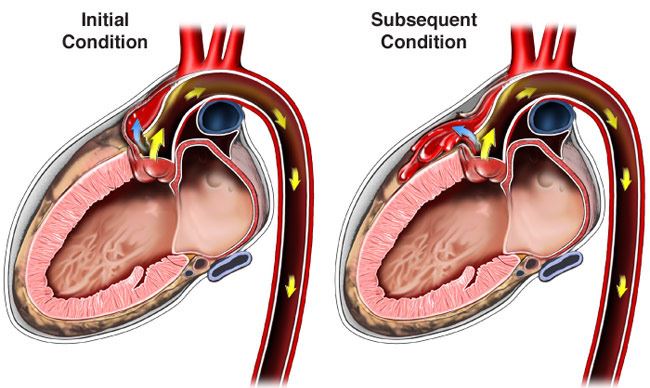Aortic Dissection
Aortic dissection is a cardiac emergency and can be fatal if not diagnosed and treated quickly. Anyone who experiences an acute onset of chest pain, fullness, discomfort or pressure; shortness of breath; pain or discomfort in one or both arms, the neck, jaw or stomach; breaks out into a cold sweat, experiences nausea, vomiting or passes out should call 911 immediately. The acute onset of these symptoms could indicate the early stages of aortic dissection, a heart attack, or of another cardiac-related condition.
The aorta is the main artery in the body. It carries blood pumped from the heart to the rest of the body, including critical organs like the brain, kidneys, lungs and intestines. The aorta is made up of three layers (outer, middle and inner). In certain circumstances, a tear occurs in the inner layer of the aorta. This causes blood to leak through the tear and leads to the inner and middle layers to separate (dissect). If the blood-filled channel ruptures through the outside layer of the aorta, aortic dissection is often fatal.
Aortic dissection is relatively uncommon. The condition most frequently occurs in men in their 60s and 70s. Symptoms of aortic dissection may mimic those of other diseases, often leading to delays in diagnosis. However, when an aortic dissection is detected early and treated promptly, the chance of survival greatly improves.

Medical Illustration Copyright © 2019 Nucleus Medical Media, All rights reserved.
Types of Aortic Dissections
- “Type A” Aortic Dissection: This type of tear is located closer to the heart and can be life-threatening. It usually requires urgent surgery to repair or replace the first segment of the aorta (ascending aorta) where the tear started.
- “Type B” Aortic Dissection: This type of tear is located further from the heart (descending aorta). Though surgery is not necessary immediately, intensive medical therapy for blood pressure control is crucial.
Causes of Aortic Dissections
The causes of aortic dissection are still uncertain, but a tear inside the artery wall is a key factor. However, other conditions, traits or habits may also raise your risk for the disease. These conditions are known as risk factors and include:
Non-Modifiable Risk Factors: These factors are irreversible and cannot be changed. The more of these risk factors you have, the greater your chance of aortic dissection.
- Male gender
- Older age
- Family History/genetics
Modifiable Risk Factors: These factors can be modified, treated or controlled through medications or lifestyle changes.
- Extreme physical exertion.
- Uncontrolled high blood pressure.
- Long history of drug abuse.
Other conditions that contribute to aortic dissection:
- Pre-Existing aortic aneurysm
- Congenital heart disease
- Atherosclerosis
Symptoms of Aortic Dissections
Signs and symptoms of aortic dissection are the same as symptoms of heart attacks and may include:
- Chest pain, fullness, discomfort or pressure.
- Discomfort or pain in one or both arms, the back, neck, jaw, or stomach.
- Lightheadedness/fainting
- Fatigue
- Rapid heart rate (tachycardia) of more than 100 beats per minute.
- Heart palpitations
- Shortness of breath
- Nausea and/or vomiting
- Sweating
Diagnosis of Aortic Dissections
Your medical team will ideally ask you to describe your symptoms and have your blood pressure, pulse and temperature checked. After that, you may have diagnostic tests and procedures including one or more of the following:
Treatment of Aortic Dissections
The treatment most appropriate for you will depend on your condition, including the size and location of the tear in your artery, as well as any signs or symptoms you're experiencing. Whenever possible, doctors allow the damaged artery to heal on its own, rather than repairing it. If necessary, treatment options include aortic valve repair or replacement.
